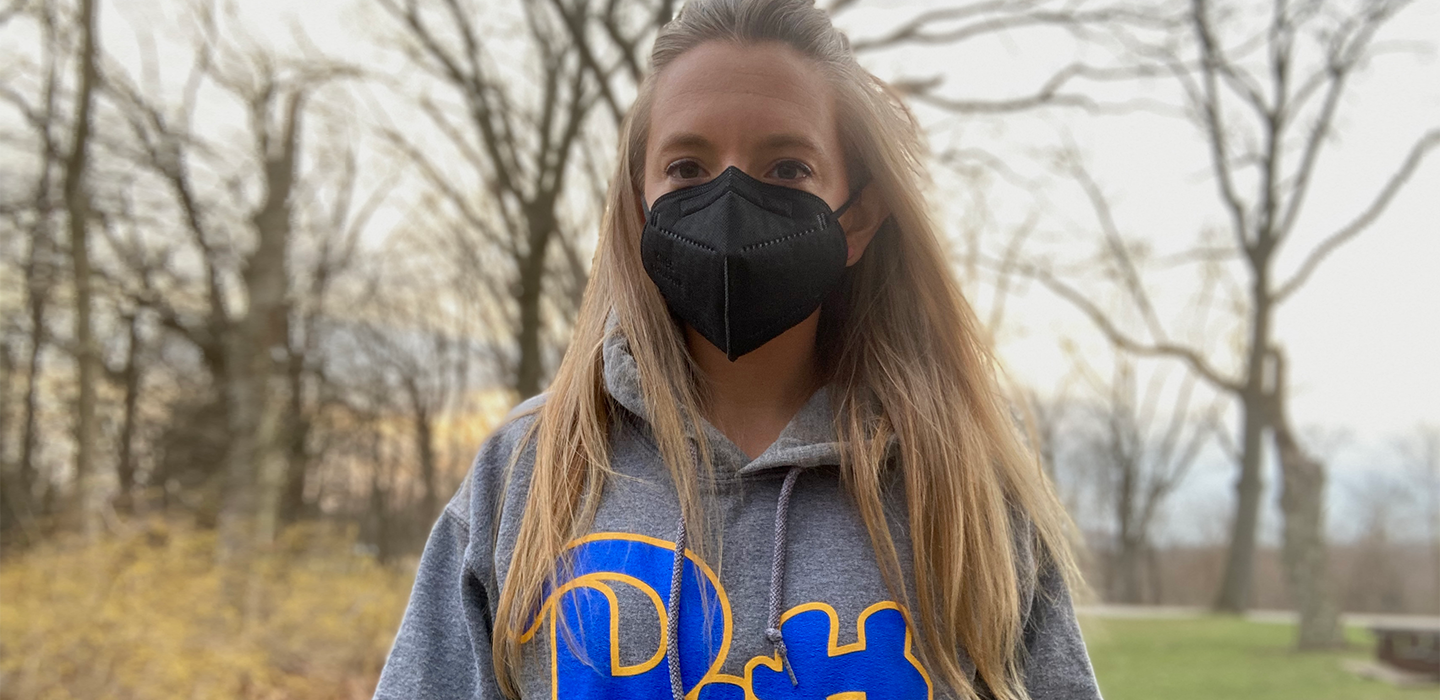
Subscribe to Pittwire Today
Get the most interesting and important stories from the University of Pittsburgh.Cary Anderson is a PhD student in behavioral marketing in Pitt’s Joseph M. Katz Graduate School of Business. She’s also someone who’s still choosing to wear a mask on campus.
Though you wouldn’t know it to look at her, Anderson is one of about 3% of people in the U.S. with an immunocompromised condition that renders them more vulnerable to infections like COVID-19. To put that number in context, it’s about the same percentage of Americans who have red hair.
“But you can’t identify someone based on their immunocompromised status out in the world,” Anderson said.
Based on a 2020 poll from Pitt’s COVID-19 Medical Response Office (CMRO), somewhere between 5-20% of the Pitt community falls under a high-risk category such as having Crohn’s disease, lupus, psoriasis, being a transplant recipient or having another health issue that affects the immune system. Other Pitt people have children under the age of five who aren’t yet eligible for COVID-19 vaccination or live with people who are at high risk for severe reactions if they contract COVID-19.
At the end of the day, there’s a large range of reasons people might choose to keep masking. The key, medical leaders at Pitt say, is to stay kind.
“We all have people in our lives, whether we know it or not,” for whom not much has changed in two years, said John Williams, director of the CMRO. “You don’t know why someone is wearing a mask, but they probably have a good reason.”
Being diagnosed with multiple sclerosis (MS) as a college student was a devastating life event for Anderson. MS is an autoimmune disease that attacks the body’s central nervous system, often leading to impaired mobility and vision. She was fortunate to have the support she needed to get through that difficult time and said she’s lucky to have found a medication that helps keep her MS symptoms under control. But the fact remains that her chronic illness means Anderson is more vulnerable to severe disease, hospitalization and death due to COVID-19.
“Any time you watch a TV commercial for a drug and it says like, ‘may increase your susceptibility to infections’ at the end — that’s an immunosuppressant,” Anderson noted, and use of such drugs is very common.
As organizations increasingly allow more individual choice and responsibility when it comes to COVID-19 mitigation, individuals’ decisions must be respected.
“I would love for masks to be something that people want to do when it’s not an inconvenience,” said Anderson. “We already do so many of these things. We hold the door open for people. We wave to people when they let us in in traffic. We don’t have to do those things. But we choose to do them because we like doing things for other people, and those aren’t huge burdens on our behavior.”
If you see someone wearing a mask, in other words, it’s nice to put on your own to help increase their comfort level.
“Do I think forcing people to wear a mask for 8 hours a day at work is sustainable? No. It’s not comfortable, and people are not going to stand for that. But, to wear in the grocery store, on the bus, in class, you know … if that was seen at least by some people as an act of kindness, that it’s just not a big deal? Any percentage of people that are masking adds a layer of protection for high-risk people.”
The bottom line in a mask-optional world? Kindness required.
Help is here
If you are still readjusting to daily life without a mask or struggling to interpret mixed messaging about the pandemic being over, you’re not alone.
While experts do not consider COVID-19 to be endemic just yet, we are moving into a new phase of the pandemic. Second boosters are now authorized for people 50 and older to increase waning immunity. Vaccines for children under five years old are expected soon. Monoclonal antibody treatments are becoming more readily available each day. These are especially effective treatments for immunocompromised individuals for whom the vaccines do not work.
Amid an ever-changing situation, immunosuppressed members of the Pitt community should talk with the health care provider who knows them best and consider contacting Student Health Service or MyHealth@Work about what resources could be helpful as part of their prevention or treatment strategy.
And, don’t forget: The best defense society has against COVID-19 is when individuals are up to date on vaccinations. Stop by the Pitt CoVax Vaccination Center for yours today.
— Micaela Fox Corn


